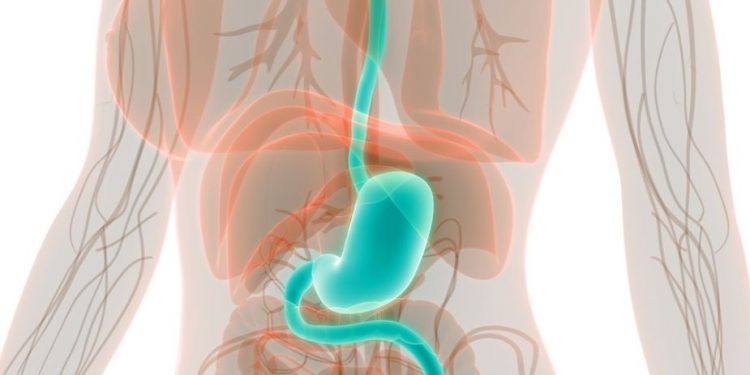Stomach cancer occurs when there is a mutation (change) in the DNA of stomach cells. Cancer cells grow rapidly and overtake normal cells, and can spread to other parts of the body.
The stomach is a part of the digestive tract that takes in food and moves nutrients through to the small intestine after swallowing. It has a thick layer of cells that lining the inside. Cancerous cells may develop in the lining of the stomach or can start in other tissues in the stomach, such as the muscle or connective tissue. Cancerous cells can also spread to lymph nodes — small organs that are part of the immune system.
In the early stages of stomach cancer, there are no symptoms (asymptomatic). As the disease progresses, people often have indigestion and pain in the upper part of their belly. They may also feel full earlier than usual (early satiety). Eventually, they might lose weight without trying to do so or have vomiting and black stools. In later stages, the cancer can spread to other parts of the stomach, esophagus, liver and spleen.
Doctors don’t routinely screen people for stomach cancer because it’s not common and the early signs can be mistaken for other conditions, such as stomach ulcers. But if you have these or other symptoms that won’t go away, see your GP. They may feel your tummy, ask you to give a poo or pee sample and carry out some blood tests. They may refer you to a specialist in hospital for more tests.

People who have a history of stomach ulcers or stomach polyps are at higher risk of developing stomach cancer. Having a diet high in salty, fatty or smoked foods is also linked to a higher risk. Having stomach surgery or a health condition called pernicious anemia or achlorhydria, where there is no hydrochloric acid in the stomach, raises the risk. So does frequent exposure to certain dusts and fumes.
Scientists don’t know what causes most stomach cancers, but they do know that it typically starts when something hurts the stomach lining. This can be a result of long-term stomach inflammation or from a stomach infection caused by a bacteria, Helicobacter pylori, which is linked to stomach ulcers.
Stomach cancer can be treated with surgery and chemotherapy. But it’s harder to cure when the tumour has reached later stages. At this stage, you might need a procedure called a subtotal or total gastrectomy to remove the affected stomach, nearby lymph nodes and parts of the esophagus, small intestine and spleen that are near the tumour. You might get chemo before the operation to shrink the tumour and after to kill any remaining cancer cells. You might also get a combination of chemotherapy and radiation therapy to kill any cancer cells that have spread to other parts of the body. These treatments can improve your quality of life. However, the cancer is likely to come back in the future.









